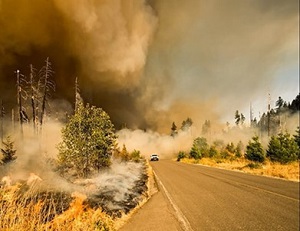Superfund Research Program
April 2023

Climate change is fueling longer wildfire seasons, leading to more frequent and intense fires that could have disastrous consequences for human health. In a recent study, researchers from the University of North Carolina at Chapel Hill (UNC) SRP Center explored the biological mechanism behind heart and lung responses to wildfire smoke.
“The better we understand the biological effects of wildfire smoke, the more we can do to reduce exposures and improve health,” said Julia Rager, Ph.D., UNC SRP investigator. “Through this research, we wanted to understand what chemicals drive toxicity, the underlying mechanisms behind health impacts, and the wildfire conditions that can be recreated for health risk assessments.”
To learn more about their work, see the NIEHS Global Environmental Health Newsletter.


